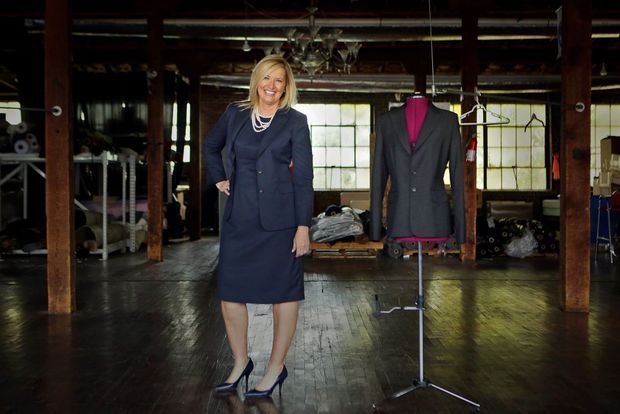By Lisa Brown
St. Louis Post-Dispatch.
During two decades working in corporate America, Johnna Beckham noticed a problem she shared with many female colleagues: the inability to find business suits that fit well.
The apparel industry has long offered services to buy custom-tailored men’s business shirts, pants and jackets, but for women, tailoring beyond getting off-the-rack pants hemmed is rare.
“You can find tons of stuff for men, but for women, it’s so difficult,” Beckham said.
While traveling to China as an executive MBA student at Washington University two years ago, Beckham had an “aha” moment that sparked the idea to start her own business: Johnna Marie, a company based in south St. Louis that makes custom-tailored women’s suits, skirts and dresses for the workplace.
At a Chinese market during her 2013 trip, Beckham and other students had their measurements taken. By the end of the week, pants and jackets they had bought that were tailored to their exact measurements were delivered to them.
“The process was great, but the product was not that good,” she said, adding she couldn’t find a similar service available to St. Louis customers when she returned to the U.S.
Beckham, who is CEO of Johnna Marie, began developing her business in the basement of her Wildwood home in 2013, then moved her offices in February to the Cortex Innovation Community co-working facility in the Central West End for six months. At CIC, she met other entrepreneurs who offered advice that helped in the company’s early stages.
Ron King, Beckham’s accounting professor and director of the Center for Experiential Learning at Washington University’s Olin Business School, was so impressed with Johnna Marie’s business model, he became an investor in the company.
King also is an angel investor in other companies, including Maryland Heights-based AppNotch, which converts websites to mobile apps, and the Napa, Calif.-based Wine Tasting Network, an online wine distributor.
“There’s such a market niche for this,” he said. “The options available for professional men and professional women is way out of whack.”
Sales through the website johnnamarie.com began in January, and the company is on track to bring in $70,000 in revenue in its first year.
If customers live outside of St. Louis, they can take their own measurements or have a tailor take them to submit with their online order. A video on the company’s website instructs women how to best measure their shoulder widths and inseams.
Locally, Johnna Marie staff visit women’s homes and offices to take measurements and hold “measure me” parties where groups of friends can get measured, said Amy Kubala, Johnna Marie’s director of creative operations.
“What we’ve found is there’s a lot more demand from customers in St. Louis than we originally thought,” Beckham said. “Customer service is so key in this business. We found that women want a personal touch.”
Johnna Marie already is expanding its geographic reach by hiring a sales associate in Kansas City.
“We see growth in revenue and interest, and hopefully by the end of this year all of the pieces will be in place to have a replicable model to have more people in other cities,” King said.
Last week, the company moved its offices to larger space in a building on South Vandeventer Avenue near Interstate 44 that houses Moxi Enterprises, a manufacturer of hospital bed mattresses.
Johnna Marie contracts with Moxi to cut and sew the individual pieces of fabric for each item of clothing — based on a digital pattern that’s unique to each customer. Instead of using a paper pattern, the measurements on the digital pattern are transmitted to a cutting table attached to a machine with a circular blade that cuts the fabric, which results in minimal fabric waste.
Finally, a team of seamstresses sews the pieces together before the clothing is pressed and hand-delivered to local customers.
“We started production in Georgia, where it was mass manufactured but realized that we needed to be hands on,” Beckham said about the decision to move production to St. Louis.
On Thursday, three seamstresses sat behind Singer sewing machines piecing together navy and camel color gabardine poly fabric for suit jackets and pants.
Cliff Holekamp, senior lecturer in entrepreneurship and director of the entrepreneurship platform at Washington University said businesses like Johnna Marie are tapping into the growing “craft” movement where people seek out locally made products.
“It started with craft beer, where people began paying a little more to have greater quality, and it’s evolved into many other products from furniture to fashion,” Holekamp said.
Johnna Marie’s pants and dresses cost more than $200 each — higher than most department store merchandise — which can serve as a challenge to attracting customers who aren’t used to paying for custom-tailored clothes.
But Holekamp said many consumers are gravitating toward merchandise made in the U.S. and are willing to pay more for custom, high-quality workmanship.
“In a world where so much of what you buy is made in China, people like to have a few things that are special,” he said.














































































































































































































































































































































































